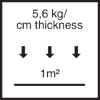Article No. 105020
Capillary active, climate-regulating plaster, in particular for mould control
Product specifications
Two layers up to 50 mm
The stated values represent typical product characteristics and are not to be construed as binding product specifications.
Field of application
- Repair, renovation and restoration of damp walls and floors that are susceptible to mould infestation
- Humidity regulation indoors
- Improving the energy performance of exterior walls
Properties
- Diffusion open and capillary active
- High proportion of capillary condensation capable pore volume
- Thermally insulating
- Two-layer application thickness up to 50 mm
- High sulphate resistance and low active alkali content (SR/NA)
- Machine workable
-
Preparation
-
Substrate requirements
Clean, dust-free and capable of supporting a load.
-
Preparations
Pre-wet absorbent substrates so that they are slightly damp.
Substrate: absorbent
Apply SP Prep as a bonding layer in a network pattern (covering 50-70% of the surface) at a layer thickness of max. 5 mm.
Alternative: apply SP Top SL as a scratch coat (contact layer).
Substrate: weakly absorbent
Apply SP Prep so that it fully covers the surface (100%) at a layer thickness of max. 5 mm.
Alternative: apply SP Top SL as a scratch coat (contact layer).
Substrate: WP Top [basic] with surface prepared with grated scraper in the [basic] interior waterproofing system
Apply product as a scratch coat (contact layer).
-
-
Application
-
Apply product using a suitable tool or machine.
Level off surface with a long float.
Finish the surface once set.
If applying an additional coating, use a grated scraper to roughen the surface once it is sufficiently dry.
Waiting time before application of further layers: 3 days.
One-layer
Single layer thickness up to 20 mm.
Two-layer
Layer thickness per coat 10 - 20 mm.
Layer thickness up to 30 mm wet-on -wet.
Layer thickness 30-50 mm, apply second layer once the first is sufficiently dry (approx. 12-24 hours).
Roughen the first layer with a render comb.
-
Application instructions
-
Once it has hardened, mortar must not be made workable again by adding either water or more wet mortar.
On critical substrates (highly uneven, fissured, mixed masonry) we recommend incorporating the reinforcement fabric in the upper third of the restoration render.
Apply additional diagonal reinforcement to the edges of building openings.
Protect wet mortar surfaces against frost, rain and drying out too quickly for at least 4 days.
Hairline/shrinkage cracks are safe and are not cause for complaint as they do not impair the properties of the mortar.
To ensure that the renovation is successful, the relevant drying conditions according to WTA Code of Practice 2-9-20/D must be met.
Please contact Remmers Technical Service (phone +49 5432 83900) before applying with machine processing.
-
-
Working tools / cleaning
-
Mixing tool, trowel, smoothing trowel, wooden disc, sponge float
-
Clean tools with water while the material is still fresh.
-
Storage / shelf life
-
If stored in an unopened container and in a dry place, the product will keep for approx. 12 months.
-
Usage
-
Approx. 5.6 kg/m²/cm layer thickness
-
Apply to a large enough trial area to determine the precise amount required.
-
General information
-
The mixing water must be of drinking water quality.
Low chromate content in accordance with Directive 2003/53/EC.
May contain traces of pyrite (iron sulphide).
Do not use on gypsum-based substrates.
The characteristic data of the product were calculated under laboratory conditions at 20°C and 65% relative humidity.
Current regulations and legal requirements must be taken into account and deviations from these must be agreed separately.
The relevant test certificates must be observed when planning and carrying out work.
-
-
Disposal instructions
-
Larger quantities of leftover product should be disposed of in the original containers in accordance with the applicable regulations. Completely empty, clean containers should be recycled. Do not dispose of together with household waste. Do not allow to enter the sewage system. Do not empty into drains.
-
-
Safety / regulations
-
For further information on the safety aspects of transporting, storing and handling the product and on disposal and environmental matters, please see the current Safety Data Sheet.
-









![WP Top [basic] WP Top [basic]](https://m.remmers.com/gebindeabbildungen/2400w/78767.png?w=100&version=1)